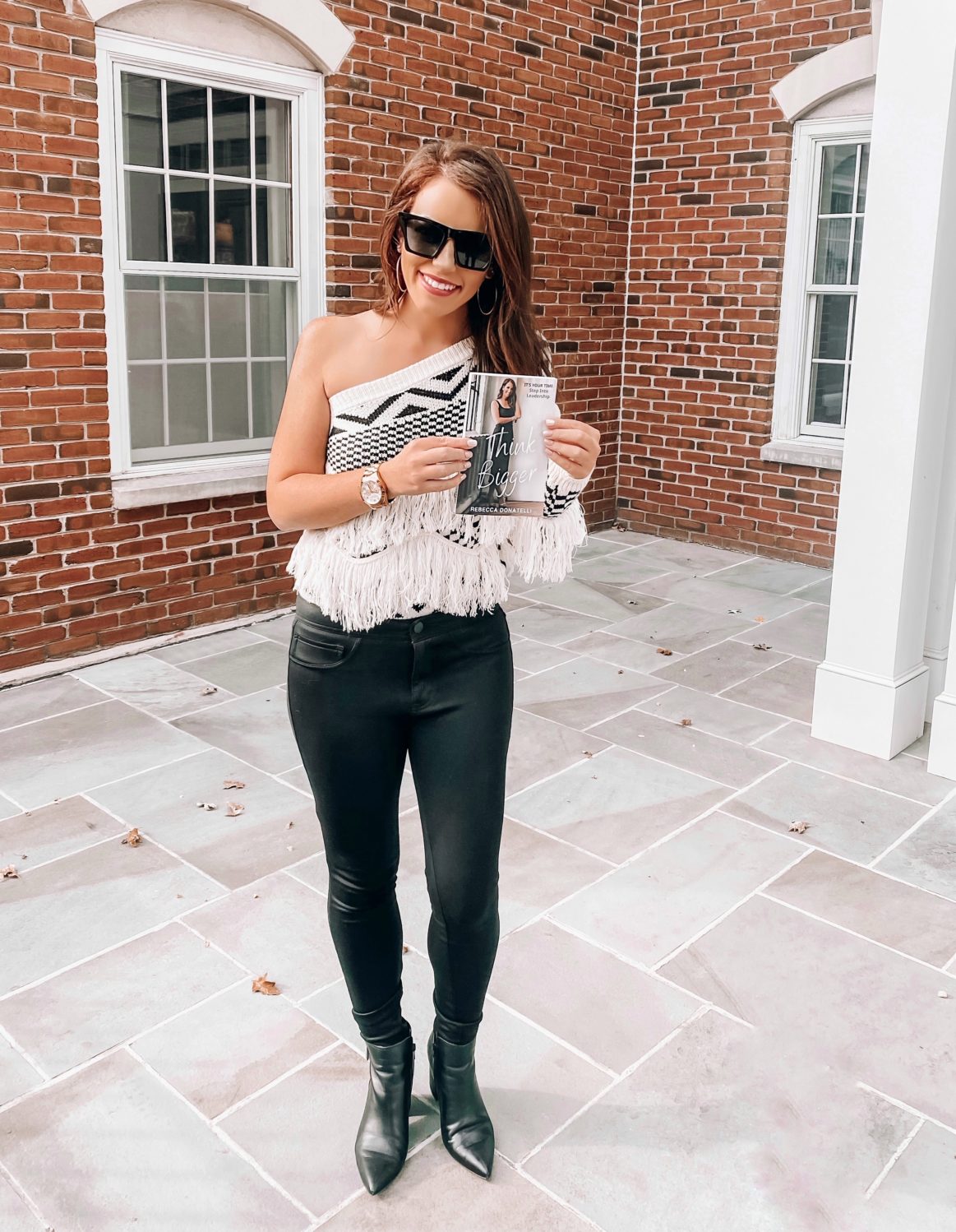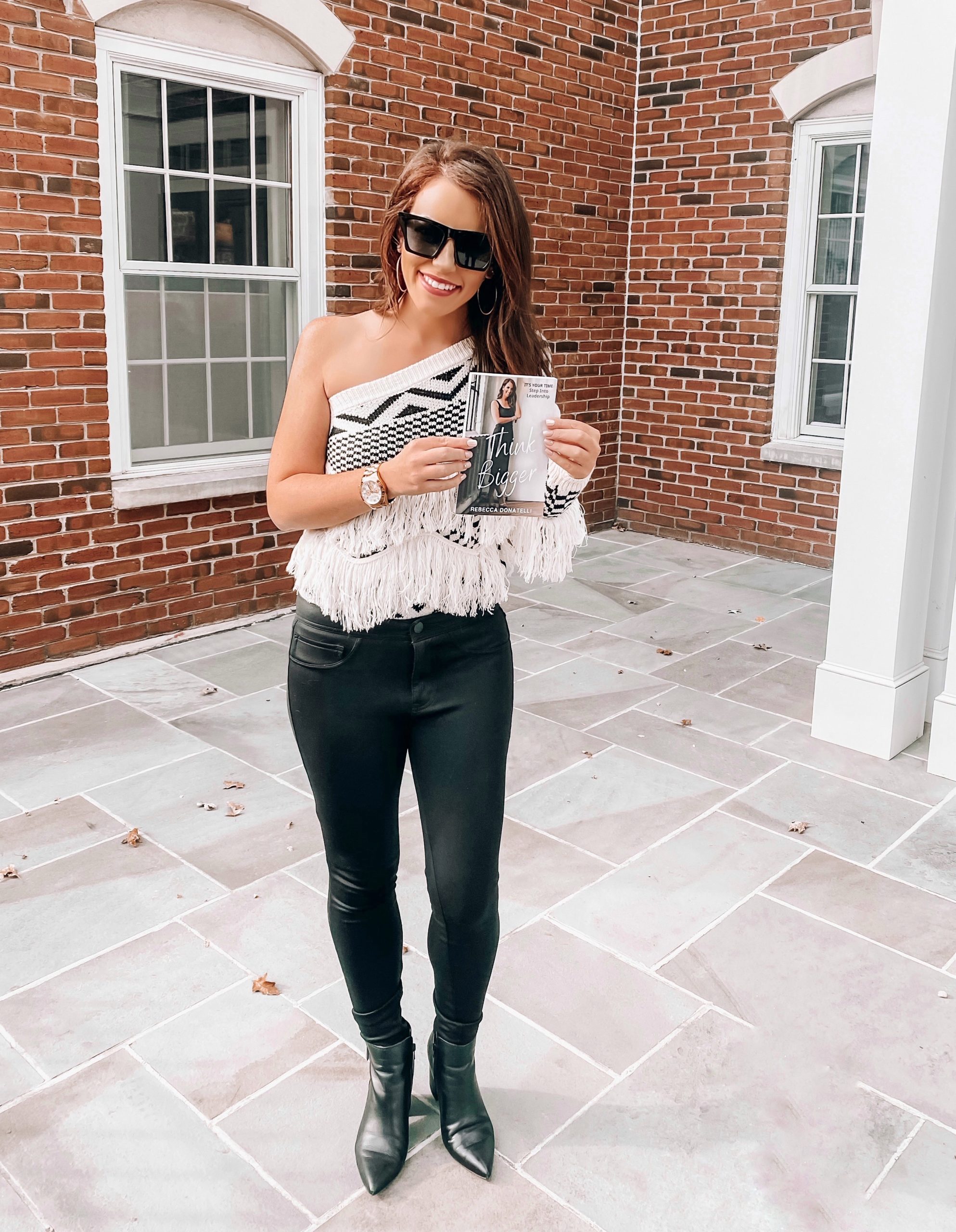
Rebecca Donatelli
By Rebecca Donatelli
October 7, 2020, in the midst of navigating a global pandemic while getting over my recent divorce, I added “published author” to my resume. I’ll never forget the moment my book arrived in the mail—I had tracked the package all day and watched the online map as the Amazon delivery person made their way through Cleveland delivering packages before getting to stops 5, 4, 3, 2, and then 1! I cried when I pulled my book out of the golden Amazon envelope. It was surreal, worth every tear I had shed while writing it, every frustration I felt, and the insane amount of vulnerability I forced myself to feel as I opened up about my life on paper with the hope of inspiring others.
To be honest, I didn’t research “how to write a book” before I wrote it. I didn’t hire anyone to help me write, and I didn’t know if I was even qualified to write the book I was writing. However, all of those things ended up making my book, Think Bigger – It’s Your Time: Step Into Leadership, as powerful as it is today.
But if you’re thinking about writing your own book, here are a few tips from my process that will hopefully help you along the way.
1. Have a purpose.
Let’s be real—many people say they want to write a book because the idea of becoming a published author sounds good. It’s like one of those bucket list items that seems to make its way to many people’s lists without actually having a real reason for being there.
Before you sit down to begin writing your book, make sure that you not only have a why, but that your why is very clearly defined. Here are a few questions I would highly encourage you to ask yourself as you define your why:
- What do I want to write about?
- Who is my target audience?
- What message do I want to get across to my readers?
- How can I effectively get my message across to those readers?
2. Create an outline.
Although I personally did absolutely zero research on how to write a book prior to actually writing it (which in hindsight, I’m grateful for), I did create an outline on day one. That helped me collect my thoughts and create a clear vision of what I wanted my book to look like. Having a roadmap from the start is crucial for navigating the writing process and keeping your thoughts streamlined. The outline does not necessarily have to be your chapters or sections (depending on how you structure your book), however, it should give some definition of what the book will look like. If you are writing a novel, who are your characters? What conflicts do they run into, and how do they overcome those conflicts? If you are writing an autobiography, what do you want your book to say about yourself and your life?
3. Writer’s block is a real thing. Don’t let it discourage you.
Yes, I admitted it: Writer’s block is a real thing. You will have moments—correction—you will have many moments, where you will encourage yourself to sit down and write, but not be able to find the words. Maybe you’re distracted by other things in your life, or maybe you’re afraid that what sounds good in your head won’t sound so hot on paper. Whether you’re Stephen King or J.K. Rowling, we’ve all been there. And let me tell you—it’s OK. Healthy, in fact. Not every moment that you sit down with the intention of writing will turn into a new chapter or even a paragraph. However, if you sit down to write and find yourself with writer’s block, here are a few tips that helped me get past it a majority of the time.
- Leave your writing space and go do something else. Throughout the nearly two years it took me to complete my first book, I had my share of writer’s block more than I’d like to admit. Many of those times, I would put the book down, and go do something that I know would either inspire me or make me feel good. That included activities like going for a long run, watching the sunset, spending time with friends, or going to dinner with someone whose conversation I knew would stimulate my mind.
- Move on to a different part of the book. For me personally, this was almost always the solution when it came to wanting to write while having the case of writer’s block. I would shift my focus to a different thought, idea, or story that I wanted to tell in the book.
- Approach your idea from a different point of view. This one can be challenging, especially if you’ve made up your mind about how you want something to sound, but can’t seem to find the words. Try approaching that idea with a fresh pair of eyes. They will still be your own, but come at it with a different perspective. You will be surprised where that takes you.
- Do NOT start your book at the beginning. The introduction of my book, which is the first thing you read after the chapter list and acknowledgments, is actually one of the very last stories I wrote. I think I was about three-quarters done with the book when I wrote that story, which kicked off the entire vibe of the book. You want to talk about REAL writer’s block? When you try to write your book beginning with page 1. It’s easy to get in your head about making it perfect from the get-go. Reality check: Your first draft will not be perfect. And that’s ok, it shouldn’t be. Start elsewhere in the book to take some of the pressure off.
4. Find both a physical and mental headspace that feels most comfortable to write.
I didn’t realize how important it is to have a dedicated place to work until I was a good way through writing my book. While I would try to mix up the location where I was writing to get my creative juices flowing, I realized there were a few locations where my writing was most solid. Find one or two places, whether they are on your couch, at a coffee shop, or even a quirky spot like under a tree (not one of mine, although I may try it for this next book I’m working on) that feel good while you are writing, and make it a point to write there as often as you can.
While finding a comfortable physical location to write is crucial, finding a good mental headspace is equally just as important. This may sound a bit funky, but I had to be in a certain mood in order to successfully write. I couldn’t just sit down at any given moment and get it done. As you write your book, you will realize when your writing is strongest, and what feels right to you.
5. Just write and be real.
As one of my favorite brands says, “Just Do It.” Seriously though, just write. There will never be a “right time” to get the book done. As someone with a massively packed schedule on the daily, writing and publishing a book seemed nearly impossible before I started. Not to mention the nerves I felt sharing intimate details of my life on paper. However, I encourage you to let your vulnerability wall down and say what’s on your mind. You’d be surprised who you can impact, no matter what message you are trying to convey or what your book is about.
Lastly, don’t beat yourself up if your book takes longer than you anticipated, or goes in a different direction than you had planned. My goal was a six-month writing timeline, but I didn’t have the book in my hand until almost two years later. There is no right or wrong when it comes to writing a book—just be real and authentic, and allow yourself to be vulnerable. Happy writing!
Rebecca Donatelli, ABR, SRS, C2EX, serves on the National Association of REALTORS® YPN Advisory Board and is the founder of The Rebecca Donatelli Team with McDowell Homes Real Estate Services in Cleveland, Ohio. Her team is in the top 5% of real estate professionals in Northeast Ohio. She was honored in REALTOR® Magazine’s 30 Under 30 class of 2019. She was also honored by the Lake & Geauga Area Association of REALTORS® as the 2020 REALTOR® of the Year. Follow her on Instagram: @rebeccadonatelli.REALTOR.


Comments 7
Congratulations on your success, Rebecca! What a wonderful accomplishment and reward for your work.
Thank you for your tips, Rebecca. I’ve been told numerous times by friends, family and even a few authors, “Write your.book!”
As an active Realtor for 36 years, I certainly have stories, but that’s not necessarily the subject matter for my book. As a devoted journal writer and traveler, I would need to share my life and experiences on a deeper level, encompassing family and faith. But that’s yet to be. We shall see!
How did you find a publisher?
I’m going to start chapter one, today. thanks for the inspiration.
Great article, thank you Rebecca!
Thanks for sharing some tips and inspiration. Congratulations on being a published author, I look forward to reading your book.
Great information, Rebecca. Thank you. One thing you wrote that is kind of cringe-inducing: “To be honest” at the beginning of your second paragraph. It sounds like sometimes you aren’t honest. or “I’m going to be honest this time.”
Thanks for the comment! I am always 100% honest, and anyone that knows me knows that. I included that phrase in there because what I was writing about is something most people do or think you are supposed to do when writing a book.
Great information. I’m working on a book now and I found it helpful to create an outline!